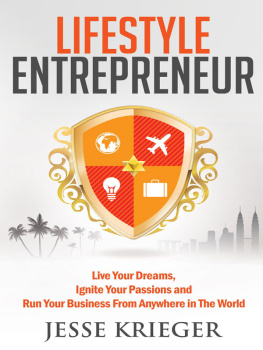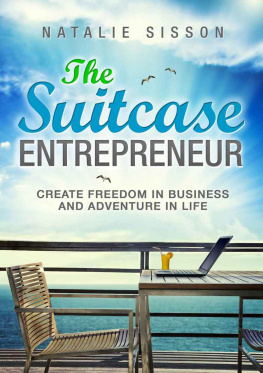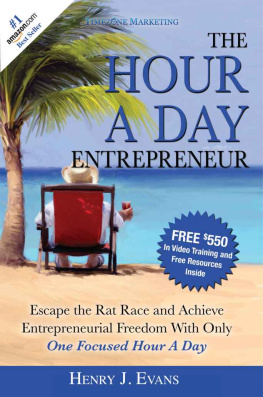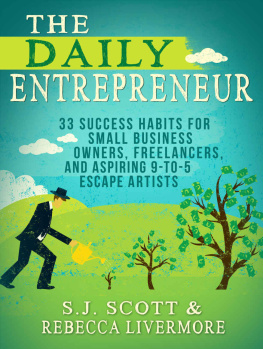Kyle Gray - The College Entrepreneur: How to leverage your university to build a business, escape the rat race and live life on your terms.
Here you can read online Kyle Gray - The College Entrepreneur: How to leverage your university to build a business, escape the rat race and live life on your terms. full text of the book (entire story) in english for free. Download pdf and epub, get meaning, cover and reviews about this ebook. year: 2016, publisher: Kyle Gray, genre: Business. Description of the work, (preface) as well as reviews are available. Best literature library LitArk.com created for fans of good reading and offers a wide selection of genres:
Romance novel
Science fiction
Adventure
Detective
Science
History
Home and family
Prose
Art
Politics
Computer
Non-fiction
Religion
Business
Children
Humor
Choose a favorite category and find really read worthwhile books. Enjoy immersion in the world of imagination, feel the emotions of the characters or learn something new for yourself, make an fascinating discovery.

The College Entrepreneur: How to leverage your university to build a business, escape the rat race and live life on your terms.: summary, description and annotation
We offer to read an annotation, description, summary or preface (depends on what the author of the book "The College Entrepreneur: How to leverage your university to build a business, escape the rat race and live life on your terms." wrote himself). If you haven't found the necessary information about the book — write in the comments, we will try to find it.
Kyle Gray: author's other books
Who wrote The College Entrepreneur: How to leverage your university to build a business, escape the rat race and live life on your terms.? Find out the surname, the name of the author of the book and a list of all author's works by series.
The College Entrepreneur: How to leverage your university to build a business, escape the rat race and live life on your terms. — read online for free the complete book (whole text) full work
Below is the text of the book, divided by pages. System saving the place of the last page read, allows you to conveniently read the book "The College Entrepreneur: How to leverage your university to build a business, escape the rat race and live life on your terms." online for free, without having to search again every time where you left off. Put a bookmark, and you can go to the page where you finished reading at any time.
Font size:
Interval:
Bookmark:

The College Entrepreneur
How to leverage your university to build a business, escape the rat race and live life on your terms.
By Kyle Gray
Copyright Kyle Gray, 2016.
All Rights Reserved.
ISBN 13: 978-0692723388
ISBN 10: 0692723382
No part of this publication may be reproduced or transmitted in any form or by any means, mechanical or electronic, including photocopying and recording, or by any information storage and retrieval system, without permission in writing from the publisher.
Requests for permission for or further information on usage of this document should be addressed to: kyle@conversioncake.com
Legal Notice
The Purchaser or Reader of this publication assumes responsibility for the use of these materials and information. Adherence to all applicable laws and regulations, federal, state, and local, or any other jurisdiction is the sole responsibility of the Purchaser or Reader.
The Author and Publisher assume no responsibility or liability whatsoever on the behalf of any Purchaser or Reader of these materials
Any perceived slights of specific people or organizations are unintentional.
Cover and Interior design by Vanessa Mendozzi - www.vanessamendozzidesign.com
Images used under licence Shutterstock.com
Contents
PART 1 - Why start a business in school?
Chapter 1 - Your University, Your Business And You
There it was The symbol of years of investment, hard work and experience: my Masters degree. It came in a large envelope, it was printed on thick, high quality paper, and was signed by people I didnt know with fancy ink. This was my permission slip for success.
Or was it?
I knew better than to trust a piece of paper to give me what I wanted. I had gone through the motions to earn this paper, but it was not what I was seeking. I had different priorities.
I graduated with something far more valuable than a diploma. It had nothing to do with grades. It was not something that could be given to me. It was something I made myself.
Today, almost three years after graduating, that piece of paper is sitting in the same envelope it came in.
I spent eight years at a large public university. I started as a confused and misguided freshman. And, along with my classmates, I jumped through all the hoops to earn a Bachelors degree. I joined the ranks of hungry graduates hoping that this piece of paper would lead to a better life.
After a few rounds of applications and interviews, I was able to get a full-time job on campus as an advisor. The job was good: it was in my field of study, it had benefits and a decent salary.
It was at this job that I learned a great deal about how universities work behind the scenes. I found that many of my assumptions about how universities worked were totally wrong. I discovered many ways students could leverage the system to their advantage.
Though it was a good job in the classic sense, I found that only a small portion of what I was doing was fulfilling. I felt trapped behind my desk, working for a system that did not work for me. I wanted to do something that mattered. I wanted to do work that interested me, that made an impact, and that allowed me to live life on my terms.
I started again as a student, enrolling in a graduate program with the hopes of learning how to start my own business. But I was not going to wait until I graduated to start. It was time to take action. I took advantage of what I had learned as an advisor, using the university system as a resource. I built key skills, valuable relationships, and received guidance on how to start and grow my own business.
I graduated as one of the top students in my class, but I didnt need to rely on my grades or my degree to attract opportunities. I had a business that was a consistent source of income. I had a valuable skillset that was sought-after by many businesses and startups. I had developed a personal brand and was recognized as an entrepreneur and marketer.
Instead of hunting for a job, job offers came to me and I could negotiate or turn them down if they didnt meet my standards. Instead of compromising my values or my goals to earn a paycheck, my interests and values became the source of income.
After graduation, I continued to build my skills in marketing and helped grow a startup to a million dollar business. I taught at an innovative startup accelerator at my university, helping other students become entrepreneurs. Best of all, I now have a business I can run from anywhere; I do work that is challenging and interesting and I do it on my own schedule. None of this would have been possible if I had just focused on getting good grades and hoped my degree would pay off.
You dont need to spend eight years at your university to get the same results. This book highlights the important lessons I learned and gives you the key strategies to do it in a fraction of the time. Its possible for you too, but only if youre ready to do what it takes.
We live in strange times...
For nearly 100 years, getting a university education was an undoubtedly sound investment. Graduates were almost guaranteed brighter futures with steady jobs, comfortable salaries, and good benefits. While there are still many great advantages to a college education--some of which we will explore in this book--the decision to attend university has become more complicated in recent years.
The promises of a degree seem more and more tenuous with each year, especially as the cost of tuition rises while incomes remain stagnant. Many jobs that were once highly valued are being lost to technology and outsourcing, and this trend is likely to continue.

Furthermore, many leading businesses and organizations are openly stating that a degree has little impact on an applicants chances of being accepted.
This week, international publishing house Penguin Random House decided to drop degrees as a requirement for job applicants, following in the footsteps of major consulting firms Ernst and Young and Price Waterhouse Coopers.
The move comes as smaller employers are shifting away from hiring graduates or university students, believing kids are coming out of university with no real skills or simply being taught the wrong things. - University degrees irrelevant to big employers
The job market has shifted as well. With the rapid change brought by quickly advancing technology, people need to be ready to make fast transitions and adaptations to stay competitive in the modern job market.
Ninety-one percent of Millennials (born between 1977-1997) expect to stay in a job for less than three years, according to the Future Workplace Multiple Generations @ Work survey of 1,189 employees and 150 managers. That means they would have 15 20 jobs over the course of their working lives! - Job Hopping Is the New Normal for Millennials.
It seems like universities have been slow to adapt to these changes. Universities are optimized to prepare graduates for long careers with only a few transitions between jobs. In the past, this model worked. It used to be that new graduates could count on job security. However, the recent recession proved that job security was an illusion. Both young and old lost their jobs and were unable to find new work.
Even tech giants that seem to be stable arent safe. This report from April 2016 covers Intel, one of the worlds biggest manufacturers of semiconductors, revealing a plan to cut a massive branch of its workforce after poor earnings:
Font size:
Interval:
Bookmark:
Similar books «The College Entrepreneur: How to leverage your university to build a business, escape the rat race and live life on your terms.»
Look at similar books to The College Entrepreneur: How to leverage your university to build a business, escape the rat race and live life on your terms.. We have selected literature similar in name and meaning in the hope of providing readers with more options to find new, interesting, not yet read works.
Discussion, reviews of the book The College Entrepreneur: How to leverage your university to build a business, escape the rat race and live life on your terms. and just readers' own opinions. Leave your comments, write what you think about the work, its meaning or the main characters. Specify what exactly you liked and what you didn't like, and why you think so.












